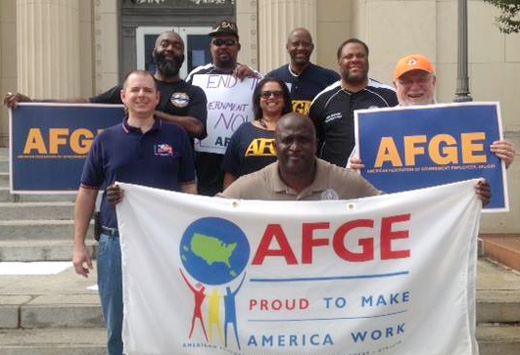
WASHINGTON (PAI) – A wide range of federal budget-cutting options, listed but not advocated by the non-partisan Congressional Budget Office (CBO), would if adopted badly hit federal workers who already suffer from past budget-cutting, the American Federation of Government Employees (AFGE) says.
Not only that, but three GOP senators want to “Walmartize” federal workers by eliminating regular pensions for all new hires, the union adds.
The union’s critique comes as congressional negotiators, facing a mid-December deadline, try to come up with an agreement on the shape of the federal budget for the fiscal year that began Oct. 1 and beyond. If they don’t find a solution, a second round of automatic budget cuts, called “sequestration,” starts in mid-January.
The budget bargainers are considering some of the ideas CBO discussed. The most notable is reducing the yearly increase in Social Security benefits by linking it to the “chained CPI” rather than the prior year’s hike in the regular Consumer Price Index. The new linkage would reduce benefits by thousands of dollars for each Social Security recipient, but CBO contends there would be no change in this fiscal year.
Except for the chained CPI, which would also affect federal and military pensions, AFGE did not discuss CBO’s cuts affecting the nation overall, other than pointing out that its tables include them. CBO made no specific recommendations, other than presenting the list and the detailed rationale for each cut. It also calculated and discussed eliminating tax loopholes and deductions.
AFGE took strong exception to CBO’s proposals for federal workers:
- CBO’s “1.2 percent increase in federal employee contributions to their pensions …would affect every employee hired before 2013,” the union said. It noted that as part of the current sequester, new hires must contribute 2.3 percent more of their paychecks to retirement funds.
“The CBO used the race to the bottom – the fact that a large number of private-sector employers no longer provide health insurance or defined benefit retirement for their retirees – as a rationale for proposing this option, which would cost federal employees $19 billion,” the union said.
- Pension cuts for workers who retire starting this January. A federal retiree’s pension is now calculated based on the highest average basic pay the worker earned during any three consecutive years of service. CBO would change the base to five years, thus reducing the average pay. Pensions would be 3 percent lower than otherwise under the calculation. “Their rationale again is the race to the bottom,” costing workers $6 billion, the union said.
- Smaller annual raises. Right now, when federal workers’ pay isn’t frozen – as it was for three years – workers get raises based on yearly percentage increases in employment costs, minus 0.5 percent. CBO would double the reduction, to 1 percent, starting in 2015, AFGE says. CBO says that move would save $800 million next year, and $53 billion through 2023 – the cost to workers that AFGE cited.
- Cut the federal workforce by 10 percent by filling only one of every three vacancies. “Doing more with less would cost federal employees $43 billion between 2015 and 2023. CBO acknowledged the federal workforce ‘may already be under strain from cost-cutting measures and that further reductions could impede the government’s ability to fulfill parts of its mission,'” AFGE noted.
Ironically, a separate CBO option says the Defense Department could save money by retiring 70,000 soldiers working in “civilian support” positions, and replacing them with 47,000 civilian workers. Civilians are cheaper, CBO says: Zero difference in 2014, $300 million savings in 2015 and $20 billion cumulative savings from 2014-2023.
While CBO’s options and estimates are all just a compilation, the pension reduction scheme from Sens. Thomas Coburn, R-Okla., Saxby Chambliss, R-Ga., and Richard Burr, R-N.C., is real. Their bill would eliminate regular pensions for any new workers the feds hire.
That measure is “a renewed attempt to Walmartize the federal government, which could well send its employees to the welfare lines,” the union warned. Current workers would keep their current pension plan. New workers couldn’t get in.
“In introducing the bill, the senators cited the for-profit private sector’s practice of providing meager benefits for their workers,” AFGE noted.
It singled out Burr for contending that “‘Right now, federal government workers receive far more generous retirement benefits than private sector employees. The cost to taxpayers of these benefits is unsustainable and we simply cannot afford it. We cannot ask taxpayers to continue to foot the bill for public employee benefits that are far more generous than their own.'”
“Burr’s ‘we just don’t have the money’ premise is fundamentally wrong,” AFGE retorted. “The Federal Employee Retirement System is fully funded. It was designed to make it impossible to ever be underfunded. The average FERS pension hovers right around $12,000-$13,000 – not anybody’s idea of a Cadillac retirement.”
Photo: AFGE activists hold demonstration in Beaumont, Texas. Facebook page.

MOST POPULAR TODAY

High Court essentially bans demonstrations, freedom of assembly in Deep South

Zionist organizations leading campaign to stop ceasefire resolutions in D.C. area

U.S. imperialism’s ‘ironclad’ support for Israel increases fascist danger at home

UN warns that Israel is still blocking humanitarian aid to Gaza







Comments